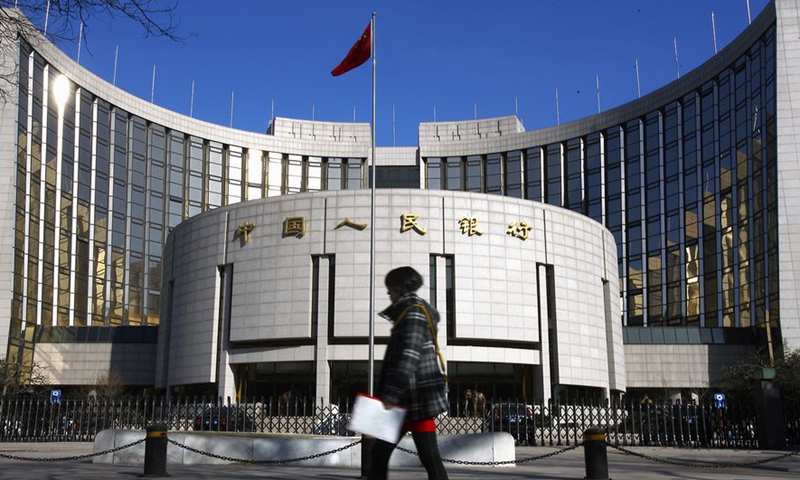
A file photo shows a pedestrian walks past the headquarters building of the People's Bank of China in Beijing, capital of China. (Xinhua)
The People's Bank of China (PBC), the central bank, and the Hong Kong Monetary Authority (HKMA) have signed a memorandum of understanding (MoU) on regulatory cooperation in fintech innovation, under which fintech supervision tools of the PBC and HKMA will be connected, according to a statement issued by the PBC on Thursday.Also on Thursday, Paul Chan, financial secretary of the Hong Kong Special Administrative Region (HKSAR), vowed that the city will further boost the offshore yuan market and promote the internationalization of the yuan.
The efforts will improve the quality and efficiency of financial services in the Guangdong-Hong Kong-Macao Greater Bay Area (GBA) and increase financial support for the construction of the GBA, as efforts to strengthen the GBA's financial connectivity continued, analysts said.
In the statement, the PBC said that cooperation in fintech innovation will be carried out steadily and orderly under laws and regulations. Under the MoU, efficient testing services will be offered for fintech innovation, which will inject new momentum for high-quality financial development in the GBA, according to the central bank.
Apart from the new MoU for fintech, the mainland and HKSAR will continue to boost cooperation in the internationalization of the yuan, Chan said on Thursday at the Financial Street Forum 2021, which is being held in Beijing.
"We will further promote the development of the offshore yuan market in Hong Kong from many aspects and help the internationalization of the yuan," he said.
Chan said that Hong Kong is studying how to gradually expand the scale and scope of cross-boundary use of the yuan in the GBA, explore more diversified yuan assets, and strengthen Hong Kong's status as a financial platform for transactions.
The HKSAR will launch more yuan-denominated investment, financing and risk management products in a timely manner, and will strive to provide effective two-way channels for yuan funds to flow between the onshore and offshore markets, Chan said.
One of the latest efforts was the landmark GBA cross-boundary Wealth Management Connect (WMC) pilot program, which saw a solid start on Tuesday.
Although the yuan has seen unimpeded use as a payment tool in the GBA, there is still great room for market expansion involving offshore yuan-denominated products, experts said.
"Hong Kong has always been a very important offshore market for the Chinese yuan. Products including cross-border yuan deposits, loans, bonds and yuan-denominated options are all developing rapidly, driven by demand," Tan Xiaofen, deputy head at the School of Finance at the Central University of Finance and Economics, told the Global Times on Thursday.
The efforts will also help the city to reduce its heavy reliance on the US dollar, which, to some extent, has evidently become a tool for the US government to impose sanctions against Hong Kong, experts said.
Hong Kong, as a highly developed free market with institutional investors accounting for more than 40 percent of the total, is an ideal channel to internationalize the yuan, Dong Dengxin, director of the Finance and Securities Institute of Wuhan University, told the Global Times on Thursday.
"The cross-boundary cooperation between the mainland and Hong Kong will provide investors with more channels for further investment," Dong said.


